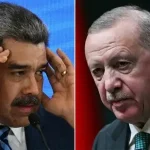The US, along with a few of its allies, threatened to attack Iraq in the early 2000s for allegedly possessing weapons of mass destruction (WMDs), including chemical weapons. Iraq denied such allegations and insisted on dialogue with the USA to diffuse tensions. In November 2002, Iraqi President Saddam Hussein accepted a United Nations Security Council resolution for the International Atomic Energy Commission (IAEA) to inspect his country’s sites for alleged possession of WMDs. By February 2003, the IAEA “found no evidence or plausible indication” of any WMDs present in Iraq.
Some of America’s closest allies, including France and Germany, strongly opposed the US decision to invade Iraq due to the absence of grounds for carrying out such an attack. Three million people gathered in Rome during February 2003 to oppose a possible US attack on Iraq, in what was the world’s largest ever anti-war rally. Thousands of similar rallies were held across the world, decrying America’s stubbornness to bomb any third-world country it pleased. However, the US ignored all pleas for sanity and dialogue and adhered to its policy of acting against any UN resolution that failed to adopt America’s stance. On 20th March 2003, the US went ahead and attacked Iraq by ground and air, joined only by a few other NATO members, including Britain.
The USA completed the invasion of Iraq in just over a month although its military occupation of Iraq lasted for another eight years, until 2011, to ensure its own interests were well preserved in the country. During all this time, no weapons of mass destruction were found in Iraq – because none existed – as had already been declared by the IAEA, and was further confirmed by US officials, including CIA analyst John Nixon who interrogated Saddam after the latter was captured by the USA and before he was hanged to death.
Many US politicians and senior officials now openly acknowledge the fact that there were no chemical weapons in Saddam’s Iraq, and that it was merely an excuse by the administration of George W. Bush to invade the oil-rich Iraq. The current US President Donald Trump recently admitted this in no uncertain terms, stating, “You call it whatever you want. I want to tell you. They [the Bush administration] lied. They said there were weapons of mass destruction [in Iraq]; there were none. And they knew there were none. There were no weapons of mass destruction.” What Trump fell just short of saying was that the invasion was, in fact, carried out to remove a ruler from office who did not wish to guard US interests in the region. The major US “interest” in Iraq was oil.
In the Saddam era, Iraq was one of the largest producers of oil, yet, its oil industry was nationalized and closed to Western companies. After the invasion, Iraq’s oil industry was largely privatized, with American and other Western oil companies conveniently operating in some of the world’s largest oilfields present in Iraq, and making huge profits there for the first time in over 30 years. Thus, the US had actually wanted to ensure a free flow of Iraqi oil to US and other Western markets to stabilize energy supplies – something Saddam had curtailed to some extent in retaliation for the stringent economic sanctions imposed on Iraq since the Gulf War in 1990.
American journalist, Antonia Juhasz, writing for CNN, reveals, “In 2000, Big Oil, including Exxon, Chevron, BP, and Shell, spent more money to get fellow oilmen Bush and Cheney into office than they had spent on any previous election… Planning for a military invasion was soon underway. Bush’s first Treasury secretary, Paul O’Neill, said in 2004, ‘Already by February [2001], the talk was mostly about logistics. Not the why [to invade Iraq], but the how and how quickly.’” Juhasz further concludes, “Oil was not the only goal of the Iraq War, but it was certainly the central one…”
Some senior US officials have since admitted how the Iraq invasion was chiefly driven by oil. Alan Greenspan, former chairman of the Federal Reserve, states, “I am saddened that it is politically inconvenient to acknowledge what everyone knows: the Iraq war is largely about oil.” General John Abizaid, former head of US Central Command and Military Operations in Iraq, agrees, “Of course it’s about oil; we can’t really deny that.” Chuck Hagel, Senator, and later, US Secretary of Defence, remarked, “People say we’re not fighting for oil. Of course, we are.”
Despite gaining access to Iraqi oilfields, the invasion and occupation of Iraq had a high cost for the USA – far beyond its own estimates. According to a 2013-study by Watson Institute for International Studies at Brown University, the Iraqi occupation had cost the USA $2.19 trillion by then. In addition, nearly 5,000 US armed forces personnel died in Iraq, with about 32,000 wounded in action. According to Trump, “We spent $2 trillion, thousands of lives. Obviously, it was a mistake. George Bush made a mistake. We can make mistakes. But that one was a beauty. We should have never been in Iraq. We have destabilized the Middle East.”
More importantly, it is the people of Iraq that have truly suffered, as the US invasion has plunged the country into new depths of chaos and anarchy, and paved way for a deadly civil war. Since 2003, the Iraqi citizens have been subject to suicide bombings, grenade attacks, roadside bombs, and other forms of deadly attacks in their homes, schools, offices, hospitals, mosques, and bazars. Serious human rights abuses have been committed by various combatants in the country, including the 2006 rape and killing of a 14-year-old Iraqi girl, and the murder of her entire family in their home, by five US Army soldiers in rural Iraq.
According to the Lancet medical journal, about 655,000 Iraqis died in the first three years of US occupation. A 2007-study by ORB International put the total war casualties figure in Iraq since the US invasion at a staggering 1.2 million. Moreover, millions of Iraqi civilians have been rendered homeless; in 2007, the UN estimated that over 2 million Iraqis had fled the country as refugees, while a further 1.7 million had been internally displaced. Many more have been affected since due to the on-going conflicts.
The US-backed central government at Baghdad has been weak and corrupt and constantly challenged by armed militias of various denominations that control different parts of the country, leading to its virtual breakup. Nouri al-Maliki was prime minister from 2006 to 2014 whose policy against Sunnis and Kurds led to discontent and armed uprisings. While the Kurds have been calling for an independent “Kurdistan”, and have recently held a referendum to that effect, the Sunni population has felt largely neglected and discriminated against by the central Shia leadership. Various regional and global powers, such as Iran, have their own stakes in Iraq which they try to protect by providing military and financial support to various militant groups.
Deep-seated sectarian divisions exist in Iraqi society, with frequent violence between Shia, Sunni, and Kurdish armed groups. To add to the anarchy, in 2014, the central government lost large swathes of its territory, including Iraq’s second largest city, Mosul, to Daesh (also known as ISIS or ISIL), whose formation had been largely facilitated by the US and other foreign powers’ policy of arming militant groups in Iraq and Syria. This brought fresh waves of violence to the war-torn country and helped establish the presence of Daesh elsewhere, including Afghanistan. The recapture of Mosul by the Iraqi and foreign forces from Daesh alone killed over 40,000 civilians, according to intelligence reports shared by The Independent.
Today, the anti-US sentiment is perhaps at its highest in Iraq, evidenced by the surprising victory of Muqtada al-Sadr’s alliance in the 2018 parliamentary elections held in May. Al-Sadr is a Shia cleric who has led two uprisings against the US occupation forces and has been vocal against interference from both USA and Iran in Iraq’s affairs. However, his political alliance, which includes communist and secular elements, cannot nominate a prime minister on its own, having won only 54 out of the 329 parliamentary seats despite emerging on top. The Iran-backed Fatah secured 47 seats, followed by 42 for the outgoing prime minister, Haider al-Abadi.
While the election result reflects the deep divisions in the Iraqi society, and the lack of political certainty ahead, the citizens of Iraq have definitely asserted their desire to regain their sovereignty by voting for Al-Sadr’s alliance. They are increasingly rejecting their country’s position as a playground for international rivalries. However, Iraq is still reeling from the effects of US occupation and is yet to regain a real sense of statehood due to its continuous internal conflicts. The country is in dire need of a strong political force that can unite the quarreling factions, demilitarise the country, and bring back the stability that had existed in Iraq prior to the US invasion in 2003.








